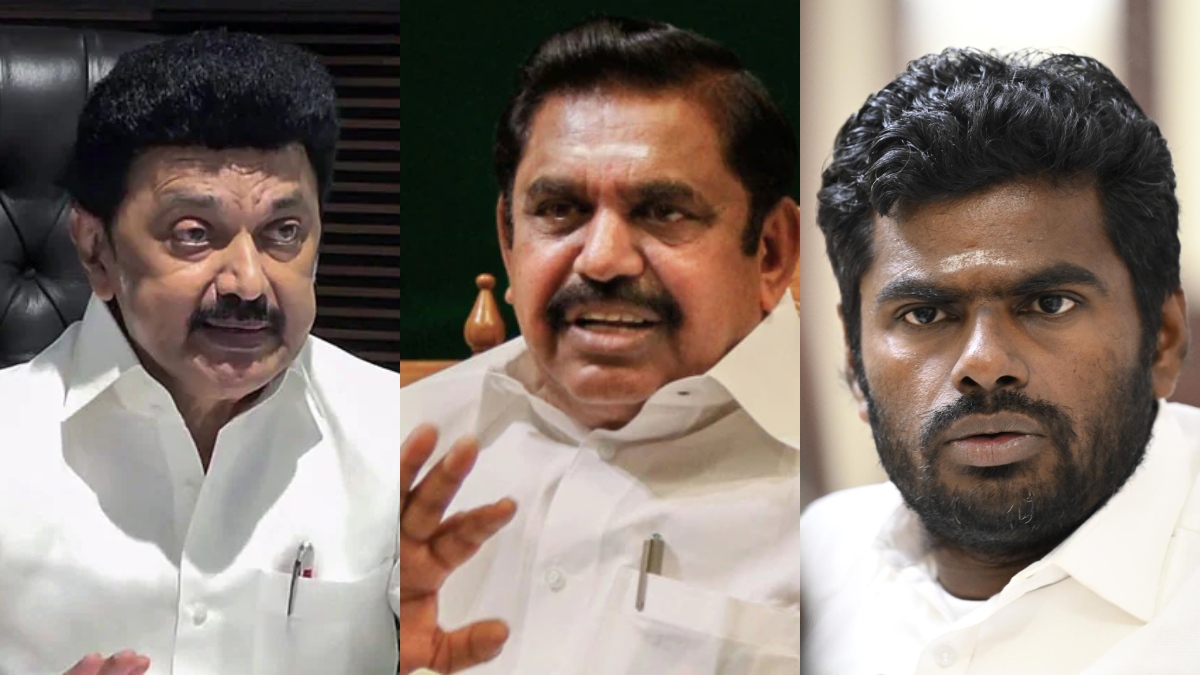Tamil Nadu politics, true to Lewis Carroll’s phrase, is becoming “curiouser and curiouser.” As the state heads toward its next assembly election, the political landscape is in flux with the ruling DMK battling anti-incumbency, the AIADMK sinking under internal fissures, and the BJP waiting to exploit every crack in the Dravidian fortress. Adding to this combustible mix is actor-turned-politician Vijay, whose new political outfit is drawing massive crowds and unsettling the traditional players.
For the DMK, led by Chief Minister M.K. Stalin, the going is getting tougher. After three years in power, the party faces accusations of arrogance and insensitivity, particularly toward the state’s majority Hindu faith. The biggest blow came from Stalin’s son and political heir, Udhayanidhi Stalin, whose remarks likening Sanatana Dharma to “dengue and cholera” sparked outrage. While the DMK has thrived on rationalist rhetoric, such uncharitable attacks risk alienating a section of the Hindu electorate that has long coexisted with Dravidian politics.
Worse, the DMK’s national ally, the Congress, remains a liability. Its leader, Rahul Gandhi’s frequent gaffes and attacks on Hindu traditions further erode the Congress’s already fragile credibility. For Stalin, this alliance is both a necessity and a burden—a “baggage” that may weigh down the DMK’s fortunes in 2026.
If the DMK is grappling with anti-incumbency, the principal Opposition, AIADMK, is struggling to hold itself together. The party under Edappadi K. Palaniswami (EPS) remains haunted by the unresolved rift with O. Panneerselvam (OPS). Their bitter feud has confused allies, disillusioned cadres, and opened space for rivals. Several smaller allies have already threatened to jump ship and align with the DMK-Congress-led INDIA bloc, though such moves carry risks of their own.

EPS has not helped matters with its inconsistent approach to the BJP. In a show of bravado, he recently declared that even if the AIADMK returned to power, it would not form a coalition government with the BJP. The statement rattled BJP cadres and raised questions about the future of the NDA in Tamil Nadu. Yet the AIADMK is hardly in a position to chart an independent course. Its weak organizational machinery and lack of a mass leader in the post-Jayalalithaa era mean that without the BJP’s resources, strategy, and vote share, the party risks political oblivion.
The BJP, for its part, has sensed an opportunity. Though it has historically struggled in Tamil Nadu, the saffron party has slowly expanded its base, particularly among urban middle classes and sections of the younger Hindu electorate disenchanted with the DMK’s rhetoric. Every quarrel within the AIADMK and every misstep by the DMK only strengthens the BJP’s hand. Unlike the AIADMK, the BJP can afford to wait—it has little to lose and much to gain from an unstable Dravidian duopoly.

This explains why EPS is expected to meet Union Home Minister Amit Shah, Prime Minister Narendra Modi’s key strategist, to mend fences. If the AIADMK is to survive, EPS may have to swallow his pride and accept a genuine NDA coalition, with BJP ministers in his cabinet should the alliance win. Such a compromise could send a powerful message to Tamil Nadu’s Hindu electorate—that the AIADMK is serious about consolidating the anti-DMK vote under a united front. Without such clarity, EPS risks handing Stalin and the DMK another term.
Ultimately, the ball lies in EPS’s court, not the BJPs. The BJP is not the major loser if ties break; its vote share will likely continue to rise regardless. For the AIADMK, however, the stakes are existential. EPS’s decision could determine not just his own career but the very survival of the party. In Tamil Nadu’s fluid political theatre, where actor Vijay’s new party is already shaking the stage, EPS cannot afford further missteps.
The 2026 election may yet prove to be the moment when Tamil Nadu politics breaks free of its rigid Dravidian binary. But whether that change comes through Vijay’s populist entry, the BJP’s patient expansion, or an NDA revival depends on how EPS plays his next move. For now, uncertainty rules, and Tamil Nadu’s politics remains as fascinating—and perilous—as ever.




